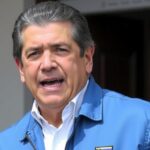Economy
Elections
Politics
ARGENTINA, BUENOS AIRES, DEMOCRACY, DEPARTMENT OF GOVERNMENT EFFICIENCY, DER, DOG, DONALD TRUMP, ECONOMICS, EL, ELON MUSK, EXCHANGE RATE, FEDERICO STURZENEGGER, JAVIER MILEI, LEADERSHIP, LUCINDA ELLIOTT, MILEI, MINISTRY OF DEREGULATION AND STATE TRANSFORMATION, MU, MUSK, NORTH AMERICA, POLITICS, REUTERS, SOUTH AMERICA, STU, STURZENEGGER, U. S, UNITED STATES, WASHINGTON
Sophia Klein
Argentina’s Bold Deregulation Efforts Under Milei’s Administration
Argentina’s Ministry of Deregulation is implementing significant government reforms to reduce bureaucracy and cut public sector jobs. President Javier Milei has successfully halved the number of ministries and is gaining international recognition for these reforms. However, challenges remain amidst economic instability and high poverty rates. The approach aims to stimulate investment and streamline government operations to foster economic recovery and growth.
In Buenos Aires, Argentina’s Ministry of Deregulation and State Transformation is actively engaged in simplifying government operations. This initiative, led by Deregulation Minister Federico Sturzenegger, aims to reduce bureaucracy and transform the economy, drawing inspiration from international figures like Elon Musk and U.S. President Donald Trump. The ministry’s efforts have resulted in a significant reduction of public sector jobs and ministries, warranting attention from observers around the world.
Under the leadership of President Javier Milei, Argentina has halved its ministries and reduced public sector employment by approximately 10%, equating to nearly 40,000 jobs. Milei’s strategies have established a hiring freeze and implemented newly introduced suitability tests for existing employees. As of December, the pass rate for these assessments was reported to be 96%.
Elon Musk’s interest in Argentina’s reforms has been evident through his discussions with President Milei and his public endorsements of the austerity measures. The collaboration between the two leaders suggests shared ideologies about the necessity of reducing government size to fortify economic health. However, significant challenges persist given Argentina’s unique economic circumstances including high poverty rates and fiscal instability, despite improvements.
While Argentina strives to emerge from a prolonged recession, its U.S. counterpart enjoys a more stable economic environment. Notably, Milei’s administration faces more significant political obstacles, requiring consensus among conservative allies to enact reforms. Despite these hurdles, Milei appears to be gaining public support, with approval ratings reflecting an uptick amid his pro-market policies.
The ongoing reforms target a reduction in bureaucratic hurdles impacting various sectors, including agriculture and social services. Minister Sturzenegger has also created an online portal to solicit public ideas for deregulation, receiving substantial community engagement. The government’s ambitious objectives are timed under emergency measures that provide a framework for expedited deregulatory actions.
Minister Sturzenegger envisions utilizing an intense focus on dismantling inefficient systems, employing a structured approach to identifying areas for closure if they do not yield satisfactory outcomes. The government’s countdown clock signifies a focused urgency in striving to streamline operations in a manner reminiscent of the so-called “chainsaw” reforms championed by Milei’s administration.
Ultimately, the contrasting scenarios between Argentina and the United States illuminate the complexities of reforming governmental operations. Argentina is navigating historical economic turbulence while attempting to instigate substantive changes that resonate with international observers. The emphasis on reducing the government’s role illustrates a commitment to achieving fiscal responsibility and invigorating economic growth.
In conclusion, Argentina’s aggressive deregulatory measures, spearheaded by President Javier Milei and Minister Federico Sturzenegger, seek to alleviate burdensome regulations and reduce the size of government. This initiative, which has garnered international attention and support, reflects a broader trend towards austerity and efficiency. However, the challenges posed by the country’s economic struggles and the political landscape warrant close monitoring as the reforms unfold.
Original Source: www.usnews.com








Post Comment